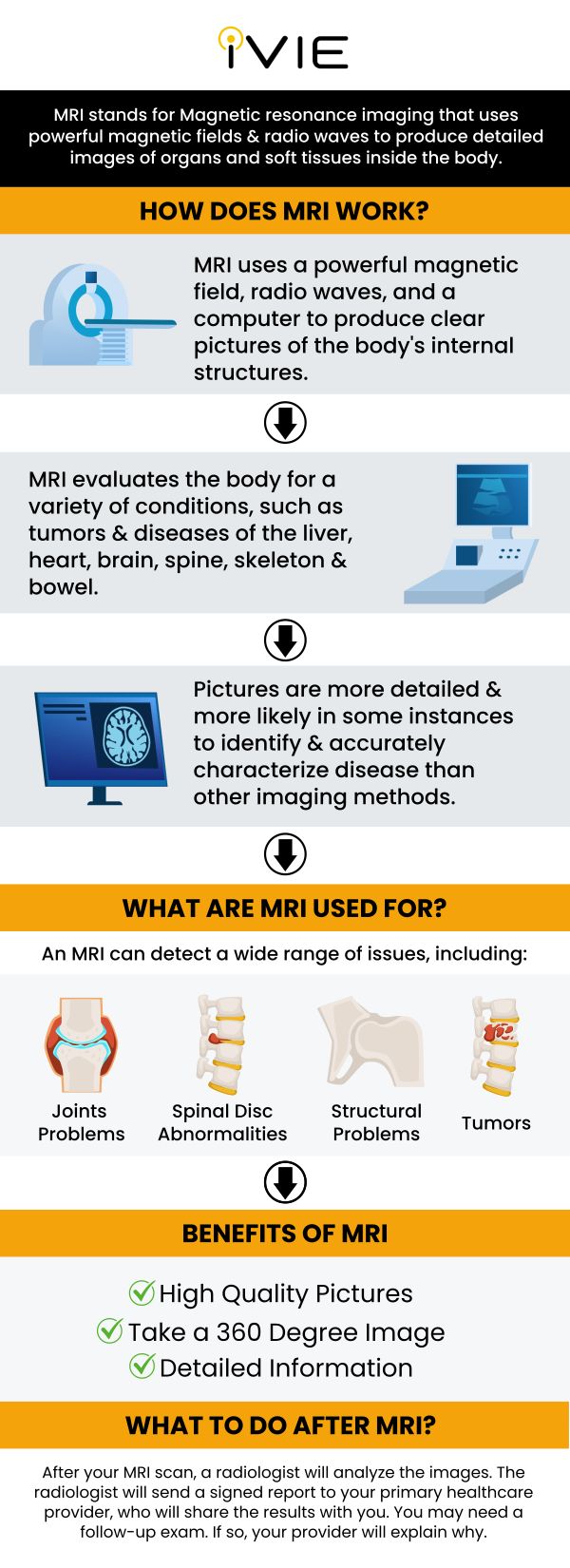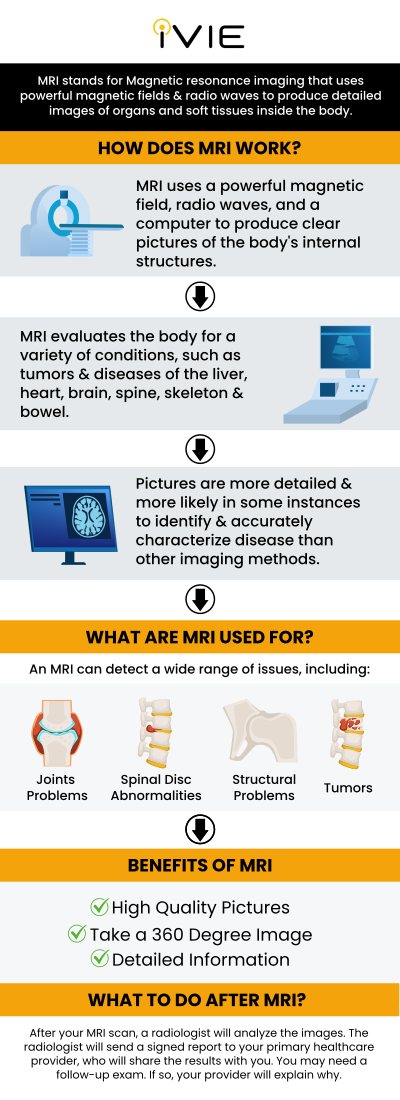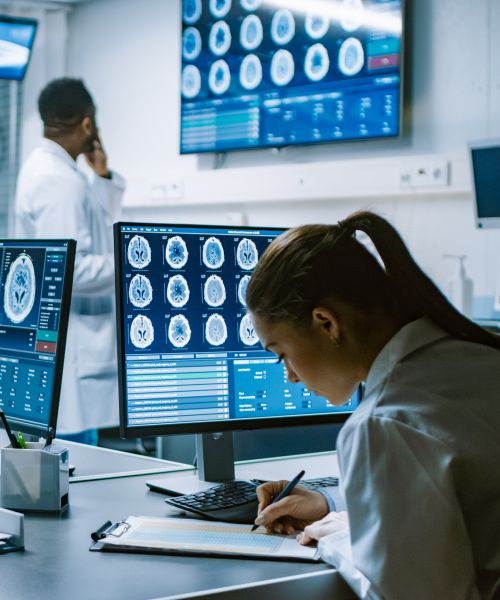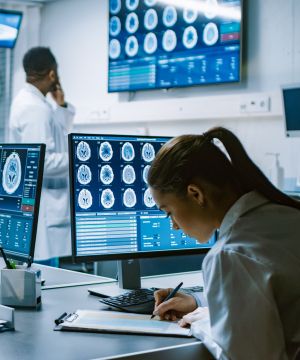Advanced MRI Scan Clinic in Los Angeles, CA
An MRI Scan Clinic provides advanced imaging services to accurately diagnose various medical conditions, from joint injuries to neurological disorders. With state-of-the-art technology, these clinics offer a non-invasive way to gain detailed insights into your health, ensuring timely and precise treatment planning. Meet Dr. Kourosh Naini and get advanced MRI scans at iVIE. For more information, contact us or book an appointment online. We are located at 11600 Washington Pl, Suit A, Culver City, CA 90066.


Table of Contents:
How is an MRI used to treat cancer?
What are the advantages of MRIs for cancer patients?
What are the benefits of early detection of cancer?
Can a full-body MRI detect all cancers?
At Dr. Kourosh Naeini’s practice at IVIE, we fully understand and appreciate the importance of Magnetic Resonance Imaging (MRI) in both the diagnosis and treatment of cancer. The MRI technology, which uses magnetic fields and radio waves to create detailed images of the body’s interior, is an essential tool in our arsenal against cancer.
A key application of MRI in our practice is in the initial diagnosis of cancer. Dr. Naeini may recommend an MRI scan if other tests, such as a physical exam or blood test, suggest a possibility of cancer. The MRI provides us with clear, detailed images of any affected areas and aids in confirming the diagnosis by showing the size, shape, and location of the tumor.
MRI also plays a significant role in our practice in staging cancer and determining the extent of the disease within the body. Through the images obtained, we can determine whether the cancer has spread to other parts of the body or metastasized. This information is vital in deciding the most effective treatment plan.
Moreover, MRI is used to monitor the progress of cancer treatment. Regular scans can show whether a tumor is shrinking, growing, or staying the same. This helps us determine if a treatment is working or if a different approach is required.
The MRI is an invaluable tool in our practice, aiding in diagnosing, staging, planning treatment, guiding therapy delivery, and monitoring the disease’s progress. Without it, the process of managing and treating cancer would be significantly more challenging.
MRI provides detailed images of the body’s soft tissue structures like the brain, spinal cord, and other vital organs. This is particularly important for detecting cancers that are not easily visible through other imaging methods, such as X-rays or CT scans.
One of the advantages of MRI is its superior contrast resolution. Gadolinium-based contrast agents are used to enhance the visibility of vascularized tumors and improve lesion detection. This assists in differentiating between benign and malignant lesions and evaluating tumor response to treatment.
Advanced MRI techniques, such as functional MRI (fMRI), diffusion-weighted imaging (DWI), and perfusion-weighted imaging (PWI), are also utilized to provide insights into tumor cellularity and vascularity. These techniques are invaluable in differentiating between viable and necrotic tumor tissue and in assessing tumor aggressiveness.
Serial MRI scans are performed during and after treatment to monitor changes in tumor size, morphology, and signal characteristics. This information is invaluable in assessing treatment efficacy and guiding decisions regarding possible treatment modifications.
The use of MRI offers multiple advantages to cancer patients. It allows for detailed imaging of soft tissues, safe repeated use, superior contrast resolution, and three-dimensional views of tumors.
The benefits of spotting cancer in its initial stages are manifold and significantly improve the treatment outcome and patient’s quality of life.
1. Tailored Treatment Options: Molecular imaging allows us to identify cancer at an early and more treatable stage. This presents more options for effective treatments, ranging from surgical intervention to targeted therapies.
2. Increased Success Rates: With early detection, tumors respond better to treatment, leading to higher success rates.
3. Preserving Organ Function: Early detection allows us to potentially preserve the affected organ or structure, reducing the need for complex surgical procedures. This is crucial in maintaining the patient’s quality of life post-treatment.
4. Improved Survival Rates: Regular screenings as early detection dramatically increases survival rates. This is corroborated by studies from the National Cancer Institute, which note significantly higher survival rates for cancers caught early.
5. Better Quality of Life: Patients who catch their cancer early often enjoy a better quality of life. Patients experience minimal pain, maintain their daily routines, and have a higher chance of returning to their normal activities.
6. Cost-Efficient Healthcare: Early detection can lower the cost of cancer treatment. Late-stage cancer treatments can be costly, involving long-term hospital stays and expensive drugs.
7. Informed Decision-Making and Psychological Benefits: Our patients should be fully informed about their diagnosis and treatment options. Early detection grants patients the time to understand their condition, explore all treatment options, and make informed decisions about their care.
In conclusion, at iVIE, we prioritize early cancer detection due to its significant benefits. Regular cancer screenings are crucial, especially for those at a higher risk due to family history or lifestyle factors. Let us help you in your journey towards better health.
A full-body MRI is a comprehensive imaging technique that uses magnetic fields and radio waves to produce detailed images of the entire body. However, this technique is not universally effective in detecting all types of cancers. While it can provide invaluable information about various organs, tissues, and structures, its effectiveness can vary depending on the specific cancer type, location, and stage of development.
Various factors can affect the detectability of cancers through MRI. These include the tumor size and location, the type of cancer, and the specific characteristics of the tumor. For instance, some cancers, such as brain, spine, and musculoskeletal tumors, are typically well visualized on an MRI. However, it may be challenging to detect certain lung, liver, or pancreatic tumors.
We also understand the advantages and limitations of a full-body MRI. This procedure is non-invasive, painless, and can provide detailed images of soft tissues and internal structures. However, it may not be sensitive enough to detect all cancers, and it’s not suitable for all patients, especially those with metal implants or certain medical conditions.
While a full-body MRI is a valuable diagnostic tool, it is not a comprehensive solution for detecting all cancers. At Dr. Naeini’s practice, we utilize a range of diagnostic methods to ensure our patients receive the most accurate diagnosis and treatment plan. We carefully consider the limitations of each tool, including the potential for false positives due to benign conditions that can appear similar to cancer on an MRI scan. For more information, contact us or book an appointment online. We are located at 11600 Washington Pl, Suit A, Culver City, CA 90066. We serve patients from Culver City Los Angeles CA, Downtown LA, Beverly Hills CA, Marina del Rey CA, Venice CA, Santa Monica CA, and surrounding areas.


Additional Services You May Need
▸ Dementia Screening
▸ Aneurysm Screening
▸ Spine MRI
▸ Whole Body MRI Screening
▸ MRI Brain Screening
▸ Brain PET
▸ Work/Sport Spine Injury Diagnosis
▸ Work/Sport Brain Injury Diagnosis
▸ Whole Body PET For Cancer
▸ MRA Brain Screening


